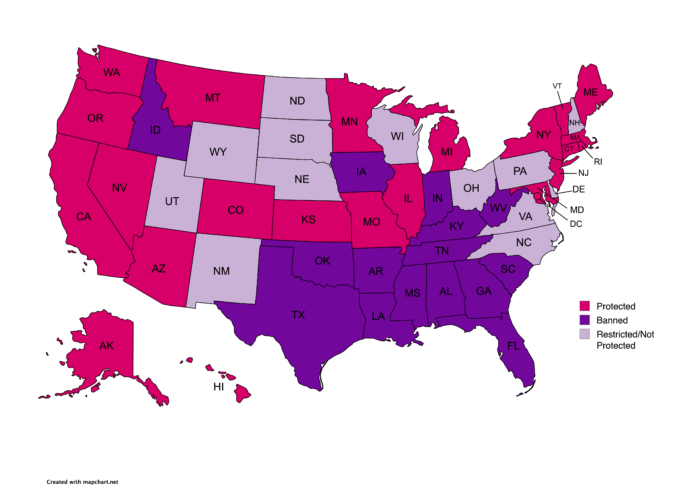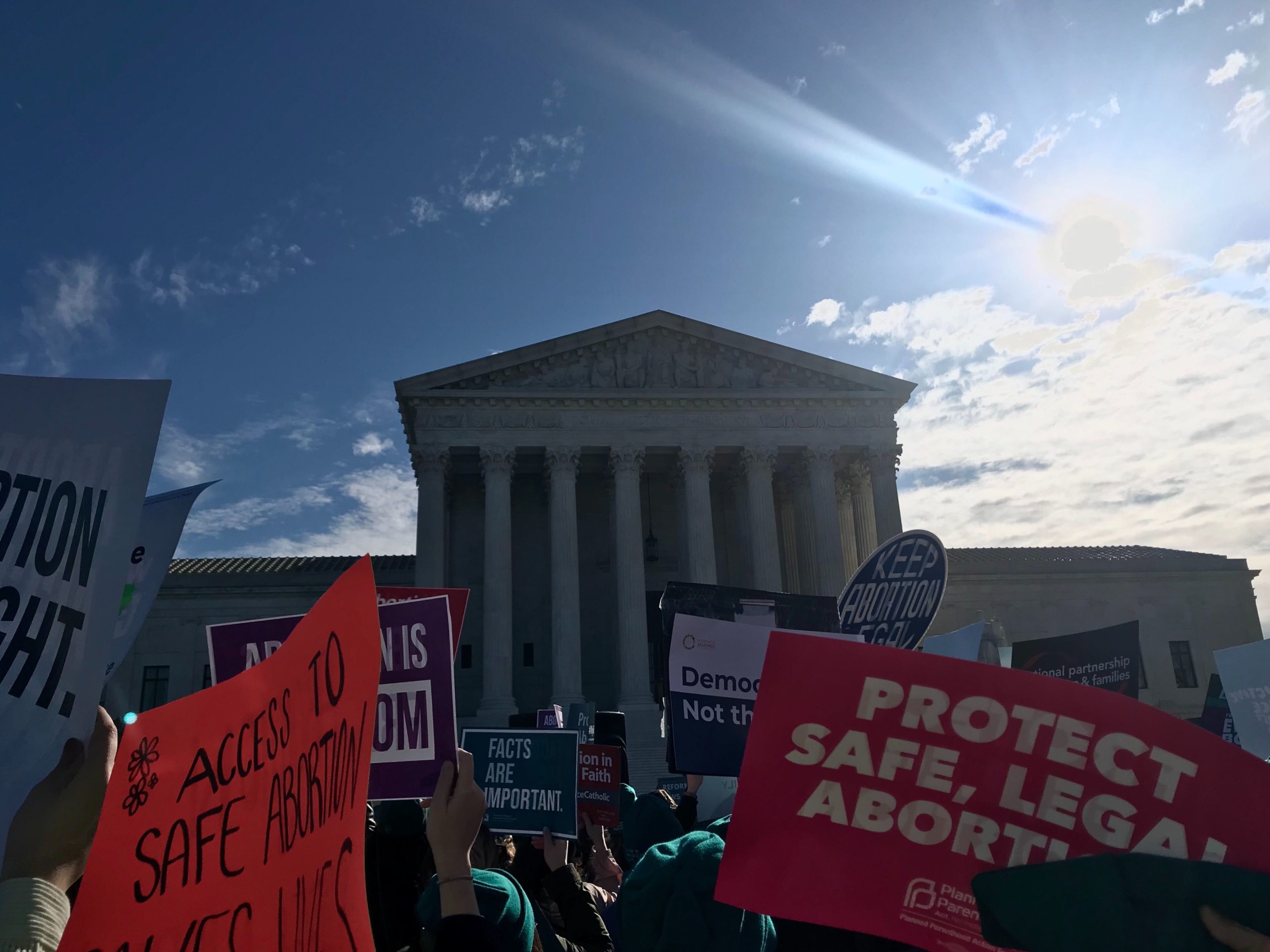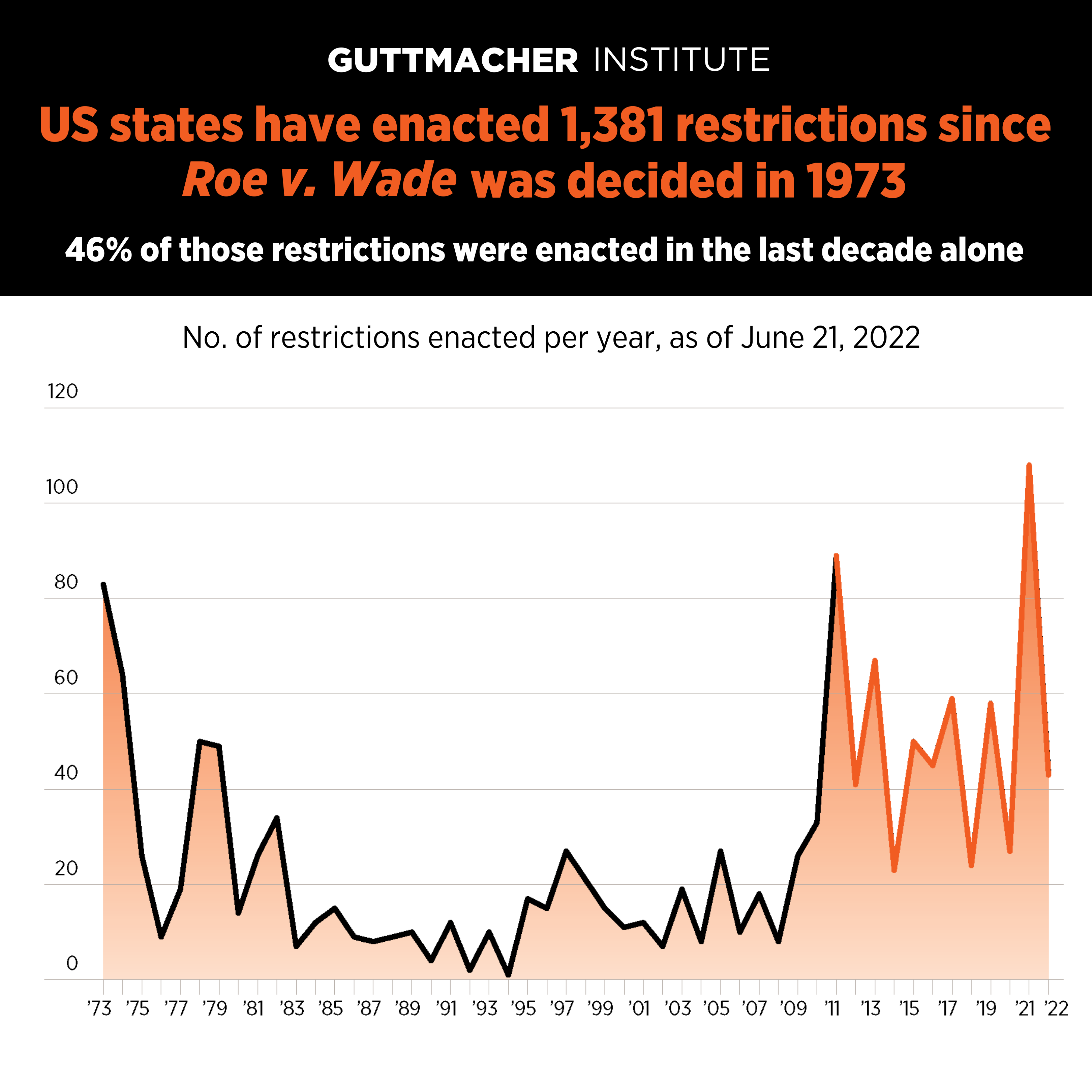Please consult these resources immediately if you are in need of abortion care:
INeedAnA.com
Abortion Finder
Plan C Pills

What You Need to Know
Abortion is a safe and common medical procedure, but that hasn’t stopped anti-choice politicians: for decades, efforts to limit access to abortion have escalated, now reaching an all-time high. As anti-abortion policymakers gain momentum across states, providers and activists continue to organize for abortion access.
On June 24, 2022, the Supreme Court issued its ruling in Dobbs v. Jackson Women’s Health Organization regarding Mississippi’s 15-week abortion ban, overturning previous opinions Roe and Casey and eliminating the constitutional right to abortion. The ruling permits each state’s government to determine its own abortion laws. As a result, many clinics have now closed completely. In multiple states, ongoing litigation is challenging state abortion bans.
What is the Status of Abortion in Your State?

Alabama
Banned
As of 6/24/2022, abortion is banned throughout the state with very limited exceptions.
Alaska
Protected
Abortion is legal throughout the state, without any limits or restrictions based on gestational duration. The 1997 Alaska Supreme Court affirmed the right to reproductive choice in the state constitution.
Arizona
Protected
As of 11/5/24, the Arizona pre-Roe ban has been repealed. Voters approved an amendment to the Arizona Constitution that protects abortion rights, removing the 15-week ban. The constitutional amendment took effect on November 25, 2024.
Arkansas
Banned
As of 6/24/2022, abortion is banned throughout the state with very limited exceptions.
California
Protected
As of 11/8/2022, abortion and contraception rights are explicitly enshrined in the state constitution after California voters approved Proposition 1. Four years prior to Roe v. Wade, the California Supreme Court had affirmed abortion rights as protected under the state constitution. Abortion is legal throughout California until “viability” (24-26 weeks of pregnancy).
Colorado
Protected
As of November 2024, abortion will remain legal in Colorado. Voters approved an amendment to the Colorado Constitution to protect abortion rights. Previously, in 2022, Colorado enacted a statutory protection for abortion as a fundamental right, and, in 2023, Colorado enacted a comprehensive shield law.
Connecticut
Protected
The Connecticut Supreme Court has previously affirmed abortion rights as protected under the state constitution, and additional laws passed recently have expanded abortion rights and access. Abortion is legal throughout Connecticut until “viability” (24-26 weeks of pregnancy).
Delaware
Protected
As of 2021, Delaware repealed their pre-Roe ban. If your pregnancy has not reached “viability,” (24-26 weeks) it is legal for you to get an abortion in Delaware.
Florida
Banned
As of 11/5/2024, the state of Florida is enforcing a 6-week abortion ban. Despite the support of the majority of Florida voters, Amendment 4, which would have amended the state constitution to prohibit government interference with the right to abortion prior to viability, failed to meet the 60% threshold required to amend the Florida Constitution.
Georgia
Banned
As of 11/23/2022, abortion is banned at 6 weeks of pregnancy throughout the state with very limited exceptions. The Georgia Supreme Court has allowed it to remain in effect although the Superior Court of Fulton County permanently enjoined the ban as unconstitutional.
Hawaii
Protected
Abortion is legal throughout Hawaii until “viability” (24-26 weeks of pregnancy). Three years prior to Roe v. Wade the state legalized abortion, becoming the first state to do so.
Idaho
Banned
As of 8/25/2022, abortion is banned throughout the state with very limited exceptions. Although you can leave the state for an abortion, Idaho argues it can enforce a trigger, criminalizing abortion.
Illinois
Protected
Since 6/12/2019, abortion has been protected as a fundamental right throughout the state and the Supreme Court of Illinois has recognized this right under the state constitution. Abortion is legal throughout Illinois until “viability” (24-26 weeks of pregnancy).
Indiana
Banned
As of 8/1/2023, abortion is banned throughout the state with very limited exceptions.
Iowa
Banned
As of July 2024, the state is enforcing a 6-week ban and will likely try to pass a total ban.
Kansas
Protected
As of July 2024, abortion is legal in Kansas up to 22 weeks. Abortion will remain legal in Kansas as long as the state constitution is not amended. While the state has enacted many restrictions on abortion, in 2019, its highest court ruled that a pregnant person’s right to personal autonomy is protected in the state’s constitution.
Kentucky
Banned
As of 7/15/2022, abortion is banned throughout the state with very limited exceptions. However, on 11/8/2022, Kentucky voters rejected Amendment 2, which would have written anti-abortion language into the state constitution.
Louisiana
Banned
As of 6/24/2022, abortion is banned throughout the state with very limited exceptions. Louisiana is enforcing its trigger ban which prohibits abortion entirely and includes civil and criminal penalties.
Maine
Protected
Maine state law protects abortion, and as of 7/5/2022, additional protections for providers and abortion seekers have been established through executive order. Abortion is legal throughout Maine until “viability” (24-26 weeks of pregnancy).
Maryland
Protected
Maryland state law protects abortion, and additional laws passed recently have expanded abortion rights and access. In 2024, voters decided to amend the Maryland Constitution to create a right to reproductive freedom.
Massachusetts
Protected
Since Roe‘s overturning, additional protections for providers and abortion seekers have been passed through both executive order and legislation, and the Supreme Court of Massachusetts has previously recognized the right to abortion under the state constitution.
Michigan
Protected
As of 11/8/2022, abortion and contraception rights are explicitly enshrined in the state constitution after Michigan voters approved Proposal 3.
Minnesota
Protected
As of 1/31/2023, abortion is protected as a fundamental right throughout the state and the Supreme Court of Minnesota has previously recognized this right under the state constitution. Abortion is legal throughout Minnesota until “viability” (24-26 weeks of pregnancy).
Mississippi
Banned
As of 7/7/2022, abortion is banned throughout the state with very limited exceptions.
Missouri
Protected
In November 2024, voters approved an amendment to the Missouri Constitution to protect reproductive freedom. On December 23, 2024, a state circuit court held that the state’s trigger ban and other abortion restrictions were unconstitutional and enjoined those laws.
Montana
Protected
As of 8/9/2022, three anti-abortion laws intended to take effect in 2021 have been blocked by the Supreme Court of Montana pending court proceedings against the state; the Supreme Court has previously recognized the right to abortion under the state constitution. Abortion is legal throughout Montana until “viability” (24-26 weeks of pregnancy). On 11/8/2022, Montana voters rejected LR-131, an anti-abortion referendum intended to criminalize abortion providers and further mislead the public about abortion.
Nebraska
Restricted
Nebraska is enforcing a 12-week abortion ban, with limited exceptions. On November 5, 2024, Nebraskans voted to enshrine the 12-week ban in the state constitution and rejected an amendment that would have protected abortion until viability.
Nevada
Protected
Abortion is legal throughout Nevada until 24 weeks of pregnancy. The state codified its right to abortion in 1990 through a referendum approved by Nevada voters. In 2024 voters approved an amendment to the Nevada Constitution to protect abortion rights, which requires a second vote in 2026 to be effective.
New Hampshire
Not Protected
There are no explicit protections for abortion in place in New Hampshire, but the Republican governor has said that abortion will continue to remain safe and legal. In 1997, the Democratic governor at the time repealed the existing pre-Roe ban. Abortion is legal throughout New Hampshire until 24 weeks of pregnancy.
New Jersey
Protected
As of 1/13/2022, abortion is protected as a fundamental right throughout the state and the Supreme Court of New Jersey has recognized this right under the state constitution. Abortion is legal throughout New Jersey, without any limits or restrictions.
New Mexico
Legal
There are no explicit protections for abortion in place in New Mexico, but the Democratic governor called on the state legislature to pass abortion protections in her 2023 State of the State address. Abortion is legal throughout the state, without any limits.
New York
Protected
As of 1/22/2019, abortion is codified as a fundamental right throughout the state; as of 6/13/2022, additional legislation to protect, expand, and strengthen abortion rights throughout the state is also in effect. In 2024, voters approved an amendment to the New York Constitution to prohibit discrimination based on pregnancy outcomes and reproductive healthcare and autonomy.
North Carolina
Restricted
As of 7/1/2023, abortion is banned at 12 weeks of pregnancy throughout the state with limited exceptions.
North Dakota
Restricted
North Dakota’s trigger ban, which would ban nearly all abortions, has been blocked indefinitely by a state judge, pending ongoing litigation. However, the state’s only abortion clinic moved to Minnesota earlier that same month. Abortion is legal throughout North Dakota until 22 weeks of pregnancy.
Ohio
Restricted
As of 10/7/2022, Ohio’s 6-week ban has been blocked indefinitely by a Hamilton County judge, pending ongoing litigation. Abortion is legal throughout Ohio until 22 weeks of pregnancy. Ohioans have approved Issue 1, which protects reproductive decision-making. The state’s 6-week LMP ban has been permanently blocked.
Oklahoma
Banned
As of 5/25/2022, abortion is banned throughout the state with very limited exceptions except when “necessary to preserve” the life of a pregnant person.
Oregon
Protected
As of 8/15/2017, the right to abortion is codified in Oregon’s state law, in addition to other protections and expansions to abortion access. Abortion is legal throughout the state, without any limits or restrictions. In 1983, abortion became a right protected by the state constitution.
Pennsylvania
Not Protected
There are no explicit protections for abortion in place in Pennsylvania, but the Democratic governor has vowed to veto any anti-abortion legislation. Abortion is legal throughout Pennsylvania until 24 weeks of pregnancy.
Rhode Island
Protected
As of 6/19/2019, the right to abortion is codified in Rhode Island’s state law. Abortion is legal throughout Rhode Island until “viability” (24-26 weeks of pregnancy). Attempts to expand access to abortion through new state law have been made since 2020 and are ongoing.
South Carolina
Banned
As of 8/23/2023, abortion is banned at 6 weeks of pregnancy throughout the state with limited exceptions. In January 2023, the South Carolina Supreme Court permanently blocked the 6-week ban, ruling it in violation of the state’s constitutional right to privacy. However, a new Court reversed this ruling in August 2023.
South Dakota
Banned
As of 6/24/2022, abortion is banned throughout the state with very limited exceptions. The state has criminalized abortion and voters failed to approve an amendment to the state constitution that would have protected abortion rights in the first trimester.
Tennessee
Banned
As of 8/25/2022, abortion is banned throughout the state with very limited exceptions.
Texas
Banned
As of 7/1/2022, abortion is banned throughout the state with very limited exceptions.
Utah
Restricted
As of 6/27/2022, abortion is banned at 18 weeks of pregnancy throughout the state with limited exceptions. Utah’s 2020 trigger law, that would prohibit nearly all abortions, is currently blocked by a temporary injunction; however, lawmakers are considering changing the rules regarding injunctions, and have discussed introducing new anti-abortion legislation during the 2023 legislative session.
Vermont
Protected
As of 11/8/2022, abortion is protected as a fundamental right throughout the state after Vermont voters approved Proposal 5, enshrining abortion rights in the state constitution. Abortion is legal throughout Vermont, without any limits or restrictions.
Virginia
Not Protected
No explicit legal protections exist for abortion and the current governor has advocated for a 15-week ban. However, as of 7/1/2020, Virginia has repealed multiple medically unnecessary restrictions on abortion access. Abortion is legal throughout Virginia until the third trimester (27 weeks of pregnancy).
Washington
Protected
Three years prior to Roe v. Wade, Washington legalized abortion through referendum vote, the first state to do so in this way. In 1991, Washington voters approved Initiative 120 (which was later made law by the state legislature), codifying abortion rights into state law. Abortion is legal throughout Washington until “viability” (24-26 weeks of pregnancy).
Washington D.C.
Protected
Abortion is legal throughout the District, without any limits or restrictions. However, without legal statehood, U.S. Congress could prohibit or restrict abortion in the District.
West Virginia
Banned
As of 9/16/2022, abortion is banned throughout the state with very limited exceptions.
Wisconsin
Not Protected
As of September 18, 2023, Planned Parenthood has resumed providing abortion services in Milwaukee and Madison up to 20 weeks of pregnancy. After the Dobbs ruling in 2022, abortion providers paused services statewide due to an 1849 law that completely banned abortion. Litigation is still ongoing regarding the law’s enforcement.
Wyoming
Not Protected
A law completely banning abortion took effect on 7/27/2022, but was immediately blocked by a judge; the ban will not take effect while challenged in the courts. Currently, abortion is legal throughout Wyoming until “viability” (24-26 weeks of pregnancy).
Sources
In 2021, Texas’ SB8 law set off a wave of anti-abortion sentiment and presented new hurdles for reproductive rights.
This was the first time a six-week ban has actually taken effect—and one of the most extreme laws we’ve seen. At six weeks, 1 in 3 don’t know they’re pregnant, a statistic that nearly doubles for pregnant teens (15-19 years old). SB8 allows private citizens to sue anyone who “aids and abets” someone in getting an abortion after six weeks, including anyone providing transportation to a clinic or offering financial assistance for the procedure. Laws like these disproportionately harm Black people, people of color, youth, low-income people, and queer people, and threaten abortion providers.
In 2021, 108 different restrictions were enacted to create barriers to abortion access at the state and local levels—the most in one year since Roe v. Wade was decided in 1973.
The Guttmacher Institute reports 19 states enacted abortion bans in 2021. There are many different kinds of abortion bans:
- Alaska and Oklahoma passed laws banning abortion at any point in a pregnancy, only with the exception if the patient’s life is endangered;
- Idaho, Oklahoma, South Carolina, and Texas all passed 6 week bans (with few exceptions);
- Montana banned abortion after 20 weeks;
- South Dakota banned abortion specifically in cases of Down syndrome;
- and Arizona banned abortion in cases of fetal abnormality.

New TRAP laws restricting access passed in 7 states.
In Arizona, Arkansas, Indiana, Kentucky, Ohio, Oklahoma, and Tennessee, new TRAP (Targeted Regulation of Abortion Providers) laws include laws requiring fetal tissue to be buried or cremated (AZ and TN) and requiring providers to ensure another physician with admitting privileges at a hospital within 25 miles of the clinic is available if they are unable to obtain a transfer agreement (OH).
However, some states have expanded abortion access since 2021.
New Mexico repealed its pre-Roe abortion ban; Virginia repealed the law banning abortion from being covered by plans in its state insurance exchange; Hawaii passed a law permitting advanced practice nurses to provide abortion care; Washington passed a law requiring college health insurance plans that cover maternity care to also cover abortion care; and Colorado passed a law ensuring that public funds pay for abortion services.
In 2022, abortion was on the ballot in six states including California, Michigan, Vermont, Kansas, Kentucky, and Montana.
Voters in California, Michigan, and Vermont voted to establish abortion rights in their state constitutions. In Kansas and Kentucky, voters rejected ballot measures to state that nothing in their state constitutions creates a right to abortion or requires government funding of abortions. Voters rejected a measure called the Born-Alive Infant Protection Act in Montana.
In 2024, abortion-related ballot measures hit a record of 11 measures, 7 of which were approved.
Ten of the measures addressed state constitutions. These were approved in seven states including Arizona, Colorado, Maryland, Missouri, Montana, New York, and Nevada. In Florida, Nebraska, and South Dakota, ballot measures were not approved. Amendments in Florida require a 60% threshold to be added to the constitution, and despite receiving 57% support which is a majority, it did not pass. Nebraska had two competing ballot measures in 2024; Initiative 434 which prohibits abortions after the first trimester into the Nebraska Constitution and Initiative 439 which would have provided the state constitutional right. Initiative 434 was approved, and Initiative 439 was defeated.
Millions of Americans turned out in recent elections to support abortion access and enshrine their reproductive rights in their states.

Join the Fight for Abortion Access
Learn about bringing the Adopt-A-Clinic and/or Expose Fake Clinics campaign(s) to your campus and community!

